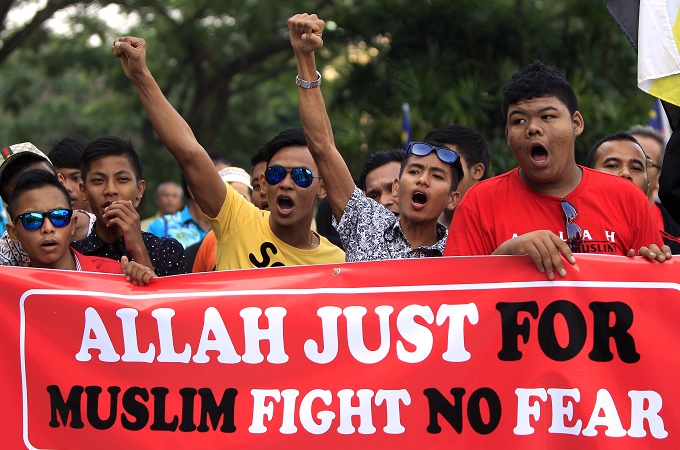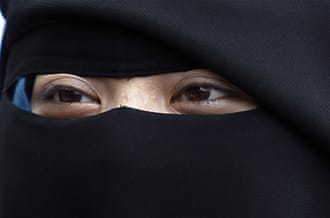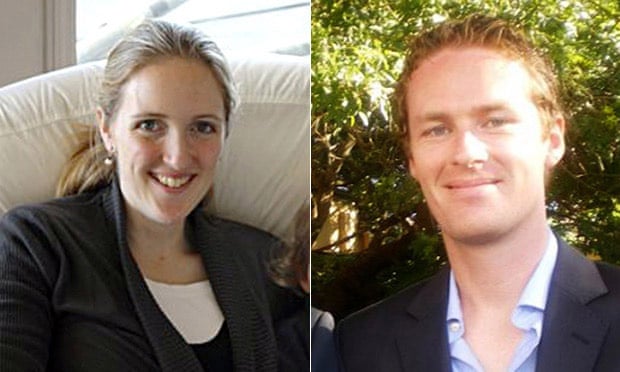Gallery: Siege in Martin Place, Sydney

Photo: Lindt Cafe manager, 34-year-old Tori Johnson, who was killed in the siege. (Supplied)
Related Story: Live: Tributes flow for victims killed in Lindt cafe siege in Sydney
The cafe manager killed in the dramatic final moments of a siege in Sydney was shot while trying to grab the gunman's weapon, sources say.
Tori Johnson, 34, and Sydney lawyer Katrina Dawson, 38, died following the 16-hour siege at the Lindt Chocolate Cafe in Sydney's Martin Place.
Police stormed the building after explosions and yelling were heard about 2:10am (AEDT).
Multiple sources have told the ABC that Mr Johnson tried to grab the gunman's weapon when he appeared to be falling asleep.
Authorities would not confirm whether he and Ms Dawson were shot by the gunman or killed in crossfire.
 Photo: Lawyer Katrina Dawson (left) and Lindt cafe manager Tori Johnson died after being held by a gunman for more than 16 hours. (Supplied)
Photo: Lawyer Katrina Dawson (left) and Lindt cafe manager Tori Johnson died after being held by a gunman for more than 16 hours. (Supplied)
Seventeen people were taken hostage by self-styled Iranian cleric Man Haron Monis shortly before 10:00am on Monday morning, but five ran free later that afternoon.
Police said three female hostages, aged 75, 52 and 43, sustained gunshot wounds and all were in a stable condition.
A police officer, 39, was treated for a minor gunshot wound to his face and discharged from hospital.
Two pregnant hostages, aged 30 and 35, were assessed at the scene.
Mr Johnson's parents released a statement expressing their sorrow and thanking police and the public.
"We are so proud of our beautiful boy Tori, gone from this Earth but forever in our memories," it said.
"Let us all pray for peace on Earth."
Prime Minister Tony Abbott has visited Martin Place, where he and hundreds of members of the public have left flowers and signed condolence books.
Man Haron Monis had been released on bail
NSW Deputy Police Commissioner Catherine Burn said Monis was well-known to police and had a history of crime and violence.
Key Points:
- Two hostages and gunman Man Haron Monis killed in siege
- Tori Johnson, 34, and Katrina Dawson, 38, were pronounced dead after being taken to hospital
- Loud explosions and yelling were heard when police entered the cafe about 2:00am (AEDT)
- Monis held 17 hostages in the cafe, a dozen of them for more than 16 hours
- Several hostages emerged from the cafe before police stormed the building
- Police say Monis acted alone and no explosive devices were found at the cafe
- Monis was an Iranian cleric on bail for a string of violent offences, including being an accessory to the murder of his wife
- Prime Minister Tony Abbott described the siege as a "brush with terrorism" and said the perpetrator had used the "symbolism" of Islamic State
She could not confirm if the gunman fired at the hostages, or whether Mr Johnson was trying to wrestle Monis's gun away from him.
"We have not even had an opportunity to properly and thoroughly gain that information from the people who were in there," Deputy Commissioner Burn said.
"Every single bit of information will be gathered over the next period of time but it is difficult at the moment because we are dealing with people who are understandably traumatised about what has happened, and it will take us time to piece together what has occurred."
The 50-year-old gunman, who was granted political asylum in Australia, was pronounced dead after being taken to hospital.
Monis was on bail for a string of violent offences, including being an accessory to the murder of his ex-wife.
He was also facing more than 40 sexual and indecent assault charges and had a conviction for sending offensive letters to families of deceased Australian soldiers.
 Photo: Hundreds of people have left flowers and signed condolence books at Martin Place. (702 ABC Sydney: John Donegan)
Photo: Hundreds of people have left flowers and signed condolence books at Martin Place. (702 ABC Sydney: John Donegan)
The ABC understands police seized property from the home of his girlfriend, Amirah Droudis, at Belmore in south-west Sydney this morning.
Droudis was charged last year with murder over the stabbing death of Monis's wife.
NSW Attorney-General Brad Hazzard said he was frustrated that new bail laws, which may have kept Monis in custody, have been delayed.
They are due to take effect on January 28 after police and judicial officers are trained.
Video: Police storm Lindt cafe (ABC News)
Mr Abbott said today Monis had a "long history of violent crime, infatuation with extremism and mental instability".
"As the siege unfolded yesterday, he sought to cloak his actions with the symbolism of the ISIL death cult," he said.
"There is nothing more Australian than dropping in at the local cafe for a morning coffee and it's tragic beyond words that people going about their everyday business should have been caught up in such a horrific incident."
Mr Abbott is expected to travel to Sydney this afternoon for briefings with police and security agencies.
Police saved many lives: Commissioner Andrew Scipione
Just before police stormed the building, at least five hostages came running from the cafe with their hands up and one man lay down on the floor as police patted him down.
Minutes later what sounded like gunfire and explosions could be heard.
NSW Police Commissioner Andrew Scipione said the situation changed suddenly inside the cafe, allowing more of the hostages to escape.
Police then made the quick decision to put their emergency action plan into place and they moved inside the building.
Soon after police entered the cafe, paramedic crews who had been stationed at the scene throughout the day were seen carrying people out of the building on stretchers, and one patient could be seen being resuscitated.
Thanking all the officers involved in the siege, Commissioner Scipione said: "I want to point out they have saved lives, they have saved many lives."
He said of the hostages: "I can only imagine the terror that they've been through. They are very brave people who in many cases were buying a cup of coffee and they got caught up in this dreadful affair."
"We should reflect on their courage, the courage that they displayed during the many hours in that room."
He said it was an isolated incident and urged: "Do not let this sort of incident bring about any loss of confidence of working or visiting our city."
"It was the act of an individual. This should never destroy or change the way of our life."
Muslim groups offer prayers for victims, denounce 'nutter'
Dozens of Muslim groups have issued a joint statement expressing sympathy for the families of those killed.
"We pray for the speedy recovery of all those injured and traumatised," Australia's Grand Mufti, Ibrahim Abu Mohammad, said in the statement.

In this article first published in 2009, ABC Religion broadcaster Rachael Kohn wrote about the "extreme attention-seeking behaviour" of Sheik Haron, the man behind the Sydney siege. "We are confident that with a continued display of responsibility and restraint, community harmony will be maintained."
Keysar Trad, from the Islamic Friendship Association, said the siege was the "action of a nutter", which should not be linked to global terrorism.
Monis's former lawyer, Manny Conditsis, described his client's ideology as "so strong and so powerful that it clouds his vision for common sense and objectiveness".
"Knowing that he was on bail for very serious offences, knowing that whilst he was in custody some terrible things happened to him, I thought he may consider that he has got nothing to lose, hence participating in something as desperate and outrageous as this," Mr Conditsis said.
"This is a one-off random individual. It's not a concerted terrorism event or act. It is a damaged-goods individual that has done something quite outrageous."
Commonwealth and NSW Government buildings are flying flags at half-mast and hundreds of people have visited Martin Place to leave flowers and sign condolence books.
One of them, inner-city worker Terri Lucia, said: "I just can't believe that it's happened to our country.
"I haven't slept all night, just wondering what's going to happen, and it's just so surreal. I'm just so shocked today."
Iranian-Australian Bibi Ehsani said Australia's Iranian community was shocked.
"[The] Iranian community were very saddened and heavy-hearted when they heard the news this morning and when they found out the gunman was Iranian-born," she said.
"Usually the Persian-Iranian people are very soft-hearted and very loving, caring for others."
Sydney Archbishop Anthony Fisher told a service at St Mary's Cathedral that "the heart of our city is broken by the deaths of two innocent hostages".
"Hell has touched us. Only history will tell how much December 16, 2014 will affect our attitudes, behaviour, lifestyle, in this city."
Video: Man Haron Monis reads letter he sent to family of British soldiers
This morning, NSW Premier Mike Baird addressed a media conference and said: "I come before you with the heaviest of hearts. Unbelievably overnight, we have lost some of our own in an attack we never thought we would see here in our city."
"In the past 24 hours, this city has been shaken by a tragedy that none of us could have ever imagined. The values we held dear yesterday we hold dear today. They are the values of freedom, democracy, and harmony.
"These defined us yesterday, they will define us today, they will define us tomorrow. Our first thoughts and prayers this morning are with the innocent victims of this horrendous, vicious attack."
'Hostages started pouring out of the building'
ABC reporter Siobhan Heanue described hearing a volley of gunfire and screams before officers stormed the cafe.
"The sound ricocheted throughout the tall buildings around the area... and hostages started pouring out of the building," she said.
"Some running, some able to walk, some with their hands up, and some being carried by ambulance staff."
Shortly after Monis locked the hostages inside the cafe, some were seen with their hands up while others were made to hold a black flag with Arabic writing against a window.
Heavily armed police officers took up positions in the pedestrian area, which was cleared for several blocks.
Several hours later, at about 4:00pm, two men ran from a front door of the cafe while a man wearing a Lindt apron came out of a side door.
About an hour later two women who worked at the cafe ran from the building.
The police operation has concluded and the investigation into the entire incident will be overseen by the Professional Standards Command, a police statement said.
Video: Sydney siege: Hostages flee Lindt cafe in Martin Place (ABC News)
"All information will be provided to the coroner who will determine the cause of, and make any findings about, the events leading to the deaths," the statement said.
Lindt and Sprüngli, which owns the cafe, released a statement on Facebook thanking NSW Police and offering support to the siege victims and their families.
Chairman Ernst Tanner said: "I cannot believe that such an act of violence happened."
The chairman of the US congressional homeland security committee, Michael McCaul, said American and Australian agencies were working to determine if there were any other potential plots or co-conspirators.
"[Monis] does pledge his allegiance to ISIS on his website and he calls the Australian servicemen Hitler's soldiers, so we are concerned about these types of homegrown violent extremists in Australia, but also in western Europe and in the United States," Mr McCaul said.
 Photo: Two women, representing Sydney's Muslim community, lay flowers at Martin Place. (ABC News: Jessica Kidd)
Photo: Two women, representing Sydney's Muslim community, lay flowers at Martin Place. (ABC News: Jessica Kidd)
Photo: Sydney siege gunman Man Haron Monis has been claimed as one of the jihadists of the Islamic State. (Sergio Dionisio: AAP)









 Photo: A still image released by Islamic State showing a captured Jordanian pilot. (AFP: Welayat Raqa)
Photo: A still image released by Islamic State showing a captured Jordanian pilot. (AFP: Welayat Raqa) 
 Photo: Islamic State fighters kidnapped hundreds, perhaps thousands of women and girls from the Yazidi minority. (Reuters)
Photo: Islamic State fighters kidnapped hundreds, perhaps thousands of women and girls from the Yazidi minority. (Reuters) 



 Photo: Man Haron Monis was the gunman behind the Sydney cafe siege at Martin Place. (ABC News)
Photo: Man Haron Monis was the gunman behind the Sydney cafe siege at Martin Place. (ABC News) 



 Photo: Hundreds of people have left flowers and signed condolence books at Martin Place. (702 ABC Sydney: John Donegan)
Photo: Hundreds of people have left flowers and signed condolence books at Martin Place. (702 ABC Sydney: John Donegan) 